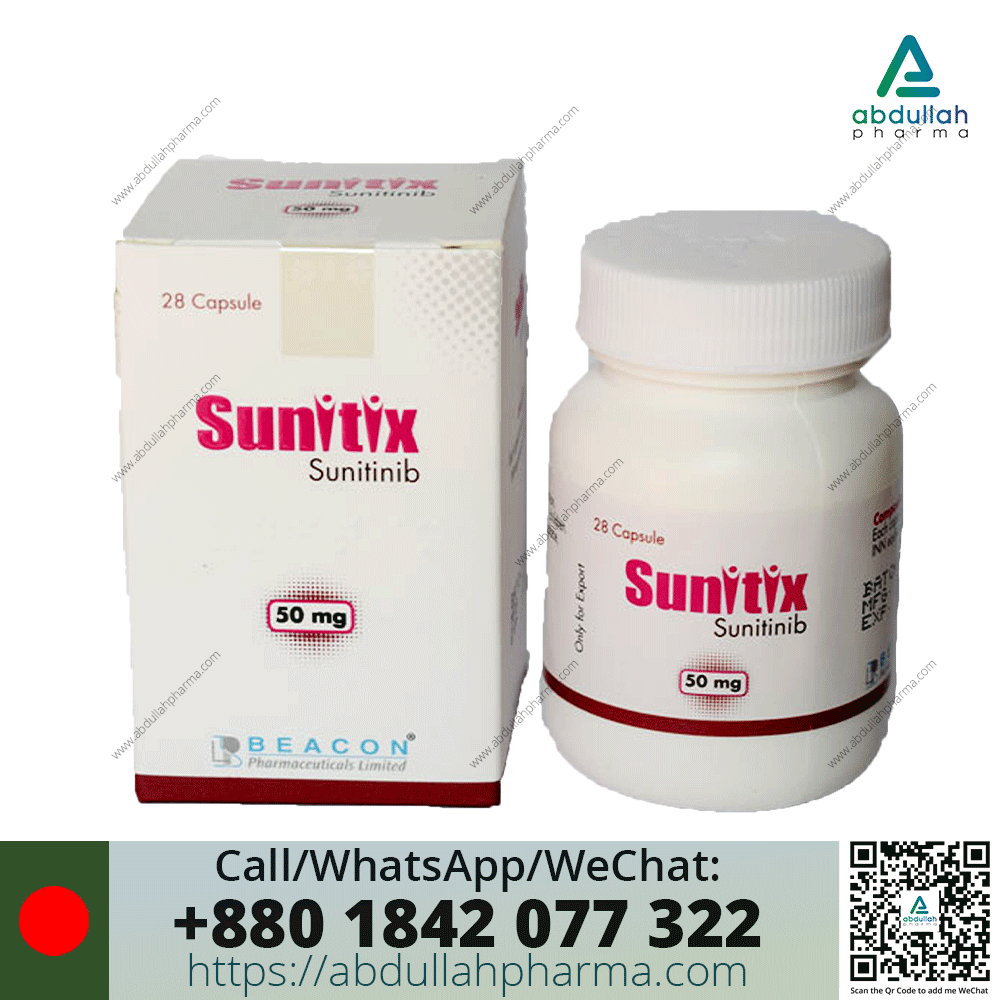Sunitix Capsule
Indications
Advanced Renal Cell Carcinoma (RCC): Sunitinib is indicated for the treatment of advanced renal cell carcinoma.
Advanced Pancreatic Neuroendocrine Tumors (pNET): Sunitinib is indicated for the treatment of progressive, well-differentiated pancreatic neuroendocrine tumors in patients with unresectable locally advanced or metastatic disease.
Therapeutic Class
Pharmacology
These include all receptors for platelet-derived growth factor (PDGF-Rs) and vascular endothelial growth factor receptors (VEGFRs), which play a role in both tumor angiogenesis and tumor cell proliferation. The simultaneous inhibition of these targets therefore reduces tumor vascularization and triggers cancer cell apoptosis and thus results in tumor shrinkage.
Sunitinib also inhibits CD117 (c-KIT), the receptor tyrosine kinase that (when improperly activated by mutation) drives the majority of gastrointestinal stromal cell tumors. It has been recommended as a second-line therapy for patients whose tumors develop mutations in c-KIT that make them resistant to imatinib, or who the cannot tolerate the drug.
In addition, sunitinib binds other receptors. These include: RET, CD114, CD135. The fact that sunitinib targets many different receptors, leads to many of its side effects such as the classic hand-foot syndrome, stomatitis, and other dermatologic toxicities.
Dosage & Administration
Recommended Dose For pNET: The recommended dose of Sunitinib for pancreatic neuroendocrine tumors (pNET) is 37.5 mg taken orally once daily continuously without a scheduled off-treatment period. Sunitinib may be taken with or without food.
Dose Modification: Dose interruption and/or dose modification in 12.5 mg increments or decrements is recommended based on individual safety and tolerability. The maximum dose administered in the Phase 3 pNET study was 50 mg daily.
Strong CYP3A4 inhibitors such as ketoconazole may increas e sunitinib plasma concentrations. Selection of an alternate concomitant medication with no or minimal enzyme inhibition potential is recommended. A dose reduction for Sunitinib to a minimum of 37.5 mg (GIST and RCC) or 25 mg (pNET) daily should be considered if Sunitinib must be co-administered with a strong CYP3A4 inhibitor
CYP3A4 inducers such as rifampin may decreas e sunitinib plasma concentrations. Selection of an alternate concomitant medication with no or minimal enzyme induction potential is recommended. A dose increase for Sunitinib to a maximum of 87.5 mg (GIST and RCC) or 62.5 mg (pNET) daily should be considered if Sunitinib must be co-administered with a CYP3A4 inducer. If dose is increased, the patient should be
Interaction
Contraindications
Side Effects
Pregnancy & Lactation
Overdose Effects
/*54745756836*/













Reviews
There are no reviews yet.